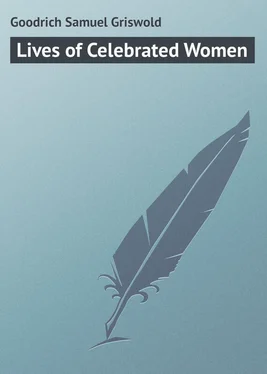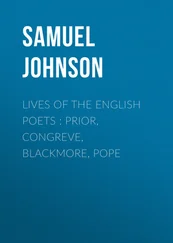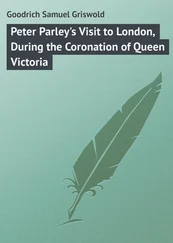Samuel Goodrich - Lives of Celebrated Women
Здесь есть возможность читать онлайн «Samuel Goodrich - Lives of Celebrated Women» — ознакомительный отрывок электронной книги совершенно бесплатно, а после прочтения отрывка купить полную версию. В некоторых случаях можно слушать аудио, скачать через торрент в формате fb2 и присутствует краткое содержание. Жанр: foreign_prose, на английском языке. Описание произведения, (предисловие) а так же отзывы посетителей доступны на портале библиотеки ЛибКат.
- Название:Lives of Celebrated Women
- Автор:
- Жанр:
- Год:неизвестен
- ISBN:нет данных
- Рейтинг книги:5 / 5. Голосов: 1
-
Избранное:Добавить в избранное
- Отзывы:
-
Ваша оценка:
- 100
- 1
- 2
- 3
- 4
- 5
Lives of Celebrated Women: краткое содержание, описание и аннотация
Предлагаем к чтению аннотацию, описание, краткое содержание или предисловие (зависит от того, что написал сам автор книги «Lives of Celebrated Women»). Если вы не нашли необходимую информацию о книге — напишите в комментариях, мы постараемся отыскать её.
Lives of Celebrated Women — читать онлайн ознакомительный отрывок
Ниже представлен текст книги, разбитый по страницам. Система сохранения места последней прочитанной страницы, позволяет с удобством читать онлайн бесплатно книгу «Lives of Celebrated Women», без необходимости каждый раз заново искать на чём Вы остановились. Поставьте закладку, и сможете в любой момент перейти на страницу, на которой закончили чтение.
Интервал:
Закладка:
“On the great national festivals of the fourth of July and twenty-second of February, the sages of the revolutionary Congress and the officers of the revolutionary army renewed their acquaintance with Mrs. Washington. Many and kindly greetings took place, with many a recollection of the days of trial. The members of the Society of Cincinnatus, after paying their respects to the chief, were seen to file off towards the parlor, where Lady Washington was in waiting to receive them, and where Wayne, and Mifflin, and Dickenson, and Stewart, and Moylan, and Hartley, and a host of veterans, were cordially welcomed as old friends, and where many an interesting reminiscence was called up, of the head-quarters and the ‘times of the revolution.’
“On Sundays, unless the weather was uncommonly severe, the president and Mrs. Washington attended divine service at Christ Church; and in the evenings, the president read to Mrs. Washington, in her chamber, a sermon, or some portion of the sacred writings. No visitors, with the exception of Mr. Trumbull, of Connecticut, – who was then speaker of the house, and afterwards governor of Connecticut, – were admitted on Sunday.
“There was one description of visitors, however, to be found about the first president’s mansion, on all days. The old soldiers repaired, as they said, to head-quarters, just to inquire after the health of his excellency and Lady Washington. They knew his excellency was, of course, much engaged; but they would like to see the good lady. One had been a soldier of the life-guard; another had been on duty, when the British threatened to surprise the head-quarters; a third had witnessed that terrible fellow, Cornwallis, surrender his sword; each one had some touching appeal, with which to introduce himself at the peaceful head-quarters of the president. All were ‘kindly bid to stay,’ were conducted to the steward’s apartments, and refreshments set before them; and, after receiving some little token from the lady, with her best wishes for the health and happiness of an old soldier, they went their ways, while blessings upon their revered commander and the good Lady Washington were uttered by many a war-worn veteran of the revolution.” 3 3 American Portrait Gallery.
In the autumn of 1789, General Washington made a tour to the Eastern States. Soon after his return, Mrs. Washington addressed a letter to Mrs. Warren, of Boston, giving an account of her views and feelings at that period, which, as it is interesting for the information it contains, and alike creditable to the head and heart of the writer, we present to the reader. It is dated December 26th, 1789.
“Your very friendly letter of last month has afforded much more satisfaction than all the formal compliments and empty ceremonies of mere etiquette could possibly have done. I am not apt to forget the feelings which have been inspired by my former society with good acquaintances, nor to be insensible to their expressions of gratitude to the president; for you know me well enough to do me the justice to believe that I am fond only of what comes from the heart. Under a conviction that the demonstrations of respect and affection to him originate in that source, I cannot deny that I have taken some interest and pleasure in them. The difficulties which first presented themselves to view on his first entering upon the presidency, seem thus to be in some measure surmounted. It is owing to the kindness of our numerous friends in all quarters that my new and unwished-for situation is not indeed a burden to me. When I was much younger, I should probably have enjoyed the innocent gayeties of life as much as most persons of my age; but I had long since placed all the prospects of my future happiness in the still enjoyments of the fireside at Mount Vernon.
“I little thought, when the war was finished, that any circumstances could possibly happen, which would call the general into public life again. I had anticipated that, from that moment, we should be suffered to grow old together in solitude and tranquillity. That was the first and dearest wish of my heart. I will not, however, contemplate with too much regret, disappointments that were inevitable, though his feelings and my own were in perfect unison with respect to our predilection for private life. Yet I cannot blame him for having acted according to his ideas of duty in obeying the voice of his country. The consciousness of having attempted to do all the good in his power, and the pleasure of finding his fellow-citizens so well satisfied with the disinterestedness of his conduct, will, doubtless, be some compensation for the great sacrifices which I know he has made. Indeed, on his journey from Mount Vernon to this place in his late tour through the Eastern States, by every public and every private information which has come to him, I am persuaded he has experienced nothing to make him repent his having acted from what he conceived to be a sense of indispensable duty. On the contrary, all his sensibility has been awakened in receiving such repeated and unequivocal proofs of sincere regard from his countrymen.
“With respect to myself, I sometimes think the arrangement is not quite as it ought to have been, – that I, who had much rather be at home, should occupy a place with which a great many younger and gayer women would be extremely pleased. As my grandchildren and domestic connections make up a great portion of the felicity which I looked for in this world, I shall hardly be able to find any substitute that will indemnify me for the loss of a part of such endearing society. I do not say this because I feel dissatisfied with my present station; for every body and every thing conspire to make me as contented as possible in it; yet I have learned too much of the vanity of human affairs to expect felicity from the scenes of public life. I am still determined to be cheerful and happy in whatever situation I may be; for I have also learned from experience that the greater part of our happiness or misery depends on our dispositions, and not on our circumstances. We carry the seeds of the one or the other about with us in our minds wherever we go.
“I have two of my grandchildren with me, who enjoy advantages in point of education, and who, I trust, by the goodness of Providence, will be a great blessing to me. My other two grandchildren are with their mother in Virginia.”
In the spring of 1797, bidding adieu to public life, Washington took leave of the seat of government, and returned to Mount Vernon, prepared in good earnest to spend the remainder of his days in retirement. He accepted, indeed, the command of the army of the United States, soon after; but this did not draw him from his home. In 1799, he died, after a brief illness. His affectionate partner was at the bedside when his spirit departed. “It is all over now,” said she. “I shall soon follow him. I have no more trials to pass through.” About two years after, she was seized with bilious fever. Being perfectly aware that her end was at hand, she assembled her grandchildren at her bedside, discoursed with them of their duties in life, of the happy influences of religion, of the consolations it had afforded her in hours of affliction, and the hopes it offered of a blessed immortality; and then, surrounded by weeping relatives, friends, and domestics, the venerable relict of Washington resigned her life into the hands of her Creator, in the seventy-first year of her age.
Few women have figured in the great drama of life, amid scenes so varied and imposing, with so few faults, and so many virtues, as Martha Washington. Identified with the Father of his country in the great events which led to our national independence, she partook much of his thoughts, views, and counsels. In the dark hours of trial, her cheerfulness soothed his anxieties, and her devotional piety aided him in drawing hope and confidence from Heaven. She was indeed the fit partner of Washington, and, in her sphere, appears to have discharged her duties with a dignity, devotion, and consistency, worthy of her exalted destinies.
Читать дальшеИнтервал:
Закладка:
Похожие книги на «Lives of Celebrated Women»
Представляем Вашему вниманию похожие книги на «Lives of Celebrated Women» списком для выбора. Мы отобрали схожую по названию и смыслу литературу в надежде предоставить читателям больше вариантов отыскать новые, интересные, ещё непрочитанные произведения.
Обсуждение, отзывы о книге «Lives of Celebrated Women» и просто собственные мнения читателей. Оставьте ваши комментарии, напишите, что Вы думаете о произведении, его смысле или главных героях. Укажите что конкретно понравилось, а что нет, и почему Вы так считаете.












